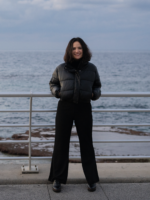Poem of the Week | July 30, 2018

Molly McCully Brown and Susannah Nevison: “Post-Op Letter in the Field Between Us”
This week, we are excited to present a new poem by Molly McCully Brown and Susannah Nevison.
Brown is the author of the poetry collection The Virginia State Colony for Epileptics and Feebleminded (Persea Books, 2017), which won the 2016 Lexi Rudnitsky First Book in Poetry Prize. New work has appeared in or is forthcoming from Tin House, Pleiades, Crazyhorse, and The New York Times. She is a 2018 United States Artists Fellow and the 2018-2019 recipient of the Amy Lowell Poetry Traveling Scholarship.
Nevison is the author of two collections of poetry, Lethal Theater (forthcoming from Ohio State University Press, 2019), winner of the 2017 The Journal/Charles B. Wheeler Poetry Prize; and Teratology (Persea Books, 2015), winner of the 2014 Lexi Rudnitsky First Book in Poetry Prize. New work has appeared in or is forthcoming from Tin House, Pleiades, Crazyhorse, and The New York Times. Beginning Fall 2018, she will be a Visiting Assistant Professor of English and Creative Writing at Sweet Briar College.
Post-Op Letter in the Field Between Us
Dear Maker,
Listen, if I can’t know
what you first
whittled me out of
I would like to see
the knife. The quick
groove in an upper lip
is called a philtrum, like
a blade slipped once,
caught just before
the damage grew
too large to make
the best of it, to fill
a body up with neat
little canals and say
you meant to cut
a river there. If I can’t
know my body before
it was riven, show me
your hands.
Right now there’s just
the ghost of how they
turned around my body,
wrenched the whole thing
toward another north.
Authors’ Note:
This poem is a piece of a larger, collaborative project that tackles questions of identity and belonging in the aftermath of lifelong medical intervention. The bulk of the project consists of letters exchanged between two disabled speakers, but this poem is one in a sequence of letters addressed to a “maker” figure who is at once surgeon, God, artist, and shifting self. The poem is an invocation that speaks to the impossible search for a true point of origin, a desire to go back and locate a stable sense of self that pre-dates loss, surgery, and trauma.
Unlike the letters that the project’s speakers write to one another, which have clear authors and addressees, this letter is not intended to arise from one particular voice or experience, but instead from a shared sense of longing, a cry raised collectively to a Maker who may or may not even exist to answer it.
SEE THE ISSUE
SUGGESTED CONTENT

Poem of the Week
Apr 29 2024
“This Body is a Songbird in a Kiln” by Athena Nassar
“This Body is a Songbird in a Kiln” by Athena Nassar is our Poem of the Week. Athena Nassar is an Egyptian-American poet, essayist, and short story writer from Atlanta,… read more

Poem of the Week
Apr 22 2024
“Faith” by Nur Turkmani
“Faith” by Nur Turkmani is our Poem of the Week. Nur Turkmani lives in Beirut and researches social movements, gender, displacement, and agriculture. Her writing appears in West Branch, The… read more

Poem of the Week
Apr 15 2024
“Love Poem for Lois” by Regan Green
“Love Poem for Lois” by Regan Green is our Poem of the Week. Regan Green grew up in Columbia, Tennessee, and now lives in Baltimore. She is a junior lecturer… read more

